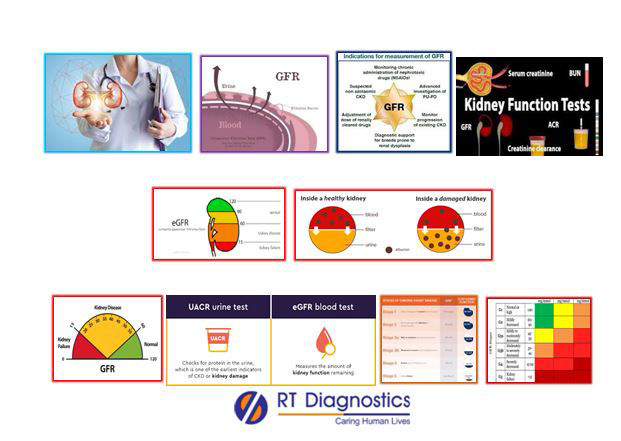Glomerular Filtration Rate: (GFR)
Why Glomerular Filtration rate Test?
CLINICAL INFORMATION
Kidney diseases affect many people universally, but they remain undetected due to mild damages (since the kidneys can compensate for the loss in renal function by increasing its reabsorption in the remaining nephrons, thus temporarily maintaining its GFR). Abnormal blood or urine tests detect the (functioning of kidneys) kidney abnormalities. Reduction in GFR is reflected with an increase in levels of urea, creatinine etc. In many cases deterioration of kidney function is reversible. The nephron is the functional unit of the kidney. Glomeruli are minute filters that help remove the metabolic end products of the cells and waste toxins (toxic metabolites of the drug in certain medications eg. antibiotics like aminoglycosides, increased heparin levels -failure to adjust dose etc) from the blood and thus eliminates them from the body as urine. The glomerulus is a tiny mesh of network with small blood vessels (capillaries) known as the tuft/cluster located at the opening of a nephron in each kidney. The blood is filtered across the capillary walls of these tuft of clusters through a glomerular filtration barrier, which results infiltrate substances to the Bowman’s capsule in a nephron. The rate at which the blood is filtered through all glomeruli is thus measured as Glomerular Filtration Rate (GFR) to assess the kidney function. GFR is defined as the sum of filtration rates of all the functioning nephrons in the kidneys. Even though GFR may be a urine test, this is performed in special situations. GFR is a blood test that looks for changes in kidney function. Hence GFR can be estimated with great accuracy based on the calculated GFR (GFR= 140 – Patient’s Age) and the result of other blood tests also such as serum creatinine (creatinine - an end product of protein digestion and the normal breakdown of muscle tissues is excreted in urine), serum Cystatin-C, BUN, Urinalysis, urine albumin, urea, uric acid etc, aids in the evaluation of the kidney function. Therefore GFR is represented as eGFR (e -estimated) or cGFR (c- calculated). Hence GFR is ordered by a physician in any birth defects that affect kidney function, family history of kidney diseases, infection and disorders associated with kidneys, kidney dysfunction leading to kidney failure, dialysis, kidney transplant, coronary artery disease, DM, high BP etc. GFR helps in the early detection of kidney diseases in the early stages when it can be treated completely. Test results of eGFR or cGFR (decline in GFR implies progression of underlying disease and/or occurrence of superimposed insult to kidneys) in kidney pathologies grades the stage of kidney damage as, stage-1 to stage-5 (based on the severity of kidney damage). GFR also helps in certain pathological conditions which are associated with decreased blood flow such as heart failure, dehydration (severe fluid loss vomiting and/or diarrhea) etc. Factors that may affect GFR are altered kidney function due to kidney disease or dysfunction (pyelonephritis - inflammation of kidneys), malnutrition, obesity, neuromuscular disorder, muscle wastage disease, chemotherapies, consumption of high meat diet, consumption of creatine supplements in bodybuilders, pregnancy etc. Clinical manifestations of kidney diseases include extreme fatigue, muscle spasms and cramps, nausea, vomiting, shortness of breath, mid back pain, difficulty urinating, altered pattern in frequency, the quantity of urination, change in the colour of the urine like foam, bloody etc, unexplained body swelling such as puffiness or swelling around the eyes, belly, ankles, wrists etc. Other conditions that may influence kidney function include DM, recurrent Urinary Tract Infections (UTIs), hypertension, heart diseases, renal calculi (kidney stones), PCOs, inflammation of kidneys in pyelonephritis, kidney failure etc. Other additional tests include kidney ultrasound, CT Scan, Creatinine clearance test, kidney biopsy etc.

General Instructions:
Sample Requirement: Specimen – As per the guidance of the physician. Test Preparation: None.
NOTE - Sample for specimen collections may vary based on the patient’s condition/cases according to the patient’s presenting complaints/signs or symptoms:
SPECIMEN REQUIREMENT (Special or Rare Cases) - As instructed and guided by Physician / Clinician / Pathologist / as per Laboratory’s requirements, according to procedures and protocols.
This Multi-Specialty Clinical Referral Laboratory RT DIAGNOSTICS provides precise and accurate tests with an extensive range of testing services to the medical centres to help in the diagnosis and identification of pathology in the test specimens for infectious diseases and also to evaluate the function of organ systems of the patient. It prevents further complications and helps to stabilize and restore health to near normalcy at the earliest without delay.



